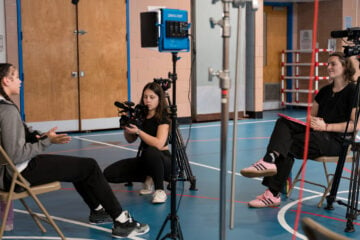This time we let our listeners hear directly from candidates
In fall 1992, a number of public broadcasting’s gatekeepers opened their gates to give candidates unedited, unmediated “free time” to talk with the electorate over the air. Here’s a first-hand report on the experience, from two public radio program directors — Dave Becker of WDUQ, Pittsburgh, and Dave Kanzeg of WCPN, Cleveland.
We’re here to confess to breaking a few broadcasting rules. They’re not in any FCC handbooks or federal code, but they seem to be universal anyway:
- Never break your regular format for politics.
- Never give up control of your station’s sound to politicians.
- Be cautious about the politicians you let on the air, especially if they aren’t in the political mainstream.
- If you’re going to do anything political, make sure both sides get exactly equal time.
- For God’s sake, don’t do anything obviously local during NPR programs.
On the other hand, we’re also here to admit to being motivated by the spirit of another very real rule: Section 312 (along with its companion 315) of the Communications Act. This is Section 312(a)(7):
“The Commission may revoke any station license or construction permit … for willful or repeated failure to allow reasonable access to or to permit purchase of reasonable amounts of time for the use of a broadcasting station by the legally qualified candidate for Federal elective office on behalf of his candidacy.”
For years the law has said that broadcasters must give candidates direct access to the electorate, and this election year the people seemed to demand it as well. Traditional newscasts and soundbites didn’t seem to satisfy the public. People questioned the overall role of media in the political process. Larry King, Arsenio Hall and other nonjournalists let candidates make contact with the voters in semimediated and unmediated settings.
By embracing the spirit of Section 312, our two stations broke every one of the five informal radio-gatekeeping rules cited above during the weeks leading up to Election Day.
We made hard-to-find political ideas available to our listeners, who reaped unique benefits as they became better-informed voters; in turn, this helped flesh out our self-image as a public service.
We did these things by offering free, unrestricted use of our stations’ broadcast signals to political candidates in our broadcast areas. It was a liberating and rewarding experience.
Cleveland and Pittsburgh, though similar in size and just 150 miles apart, turned out different results in these experiments. WCPN and WDUQ began conspiring to work out the free-access concept in mid-1991, and after a lot of phone calls, a few faxes and some collective law-crunching, we went at it from our respective angles.
What happened in Cleveland
In Cleveland, WCPN invited candidates for federal office, as well as all statewide and selected countywide candidates, to “use” our resources to reach voters with messages about themselves and their ideas. The station sent out invitations in July, and the first candidate used airtime on Aug. 19.
When candidates called to ask about the invitation, the station negotiated the particulars of the “use.” Some chose to do live call-ins; some borrowed tape recorders to gather tape and produce citizen-on-the-street segments; one asked to play the piano; others wanted to introduce grandkids and pets. WCPN honored any reasonable request.
The only thing the station (and Sections 312 and 315) required was that the candidates themselves occupy the majority of the airtime.
WCPN offered time anywhere on the schedule except during bona fide news programs. Adjacencies were fair game, however, and attracted savvy politicians who wanted to ride the aural coattails of the news.
Otherwise, the station approached the election year in the usual way. It did extensive traditional “debates” among legislative candidates, covered rallies and primaries, and aired issue discussions and call-ins, all produced by the News and Public Affairs Department. But the law allows much more. It allows federal candidates, in effect, to demand air time.
This year, campaigns called us with more feelers than ever before about getting on the air. It seemed only a matter of time before someone discovered their legal right to commandeer the public airwaves. By sending out invitations to candidates, the station took an affirmative and legally defensible step to impose some order on the process.
In all, eight candidates took us up on our offer — half of them candidates for Congress. Four were Republicans, three Democrats, one independent. Three were incumbents. Of the 10 “uses,” all but three were after Oct. 16. Total elapsed time: five hours, one minute and 24 seconds.
As it turned out, three of the eight candidates (including two of the three incumbents) who spoke on WCPN were winners on Nov. 3.
The station also got a few complaints about preempting a couple of Fresh Air shows, a “regrets” call from Dan Quayle’s office, and some inquiries from listeners who were genuinely curious about the role of the media.
And important political figures traipsed through the station to do their thing rather than our thing.
What happened in Pittsburgh
Though Pittsburgh has been starved for information since strikes shut down both daily newspapers, WDUQ (largely out of timidity) undertook a more limited experiment.
Just before Labor Day, the station offered unspecified amounts of time to candidates in two U.S. House races and one Senate race, sending invitations and explanations to about a dozen candidates of all stripes. Some candidates went right on the air; others waited until four days before Election Day.
WDUQ’s experience differed from WCPN’s in two key areas. First, the Pittsburgh station assigned political file-keeping and scheduling to the News Department — in retrospect, not the best approach. From the start, the news staff chafed over the fact that they couldn’t correct, edit or challenge anything beyond their regular news reports. That restraint was sometimes very stressful.
The second difference was the presence of a protest write-in candidate for Arlen Specter’s Senate seat. This gentleman had read broadcast law and was running largely on the strength of a grudge against the two-party system and its predominance in news coverage. After a lively internal debate, WDUQ recognized his efforts (petition activity, legal actions filed with the FCC, requests for airtime on local TV and radio outlets) as consistent with a bona fide candidacy. After extensive negotiations, and with some misgivings, the station offered him time. And there some problems began.
Most of the political “uses” of time on WDUQ were ordinary — actually, “disappointing” is a better word. They were almost all 30- or 60-minute interviews with little or no real creativity. Just talking heads. In total, nine candidates made 60 uses of WDUQ, totalling 10 hours, 39 minutes.
Forty-nine of those 60 uses were by our protest candidate, who made smarter use of his time than any other candidate. First, he used a daily five-minute spot right after Morning Edition, then used as many as 11 two-minute spots a day, some adjacent to newscasts containing stories about Lynn Yeakel and Arlen Specter. His spots were designed to rile people, and rile they did. Unfortunately, the people who were riled included members of WDUQ’s News Department and its station manager — especially after the candidate used time in one of his spots to criticize the news director at length for unprofessional behavior.
After a few calls from listeners furious about the candidate’s spots, WDUQ came close to declaring defeat and pulling out. But after long staff discussions and an on-air appeal for listener comments about the merits of the entire approach, the station discovered that callers overwhelmingly favored the whole concept! In fact, many wondered (as station staffers did) why some mainstream candidates made no use of airtime — Arlen Specter’s campaign, for instance, never even acknowledged WDUQ’s offer. Indeed, had any other candidates been as clever in using airtime as our write-in candidate, his broadcasts would not have stood out as they did. He was the only candidate to request time specifically during drive times!
WDUQ’s final postmortem isn’t yet complete, but interesting city races loom in Pittsburgh next year, and a repeat of this offer would certainly enable listeners to learn more about City Council and mayoral candidates than they ever could through the usual reports on most news outlets.
What we learned
If these adventures sound intriguing to you, we offer these thoughts, gleaned from two stations’ experience and mistakes:
- To make this work, you must come to grips with giving up control of your station’s sound — a giant if not impossible step for most radio people. Many uses will sound awful; most politicians haven’t learned how to use unrestricted airtime creatively.
- You should promote the concept a lot before you begin, as you do with any risky, innovative life-enhancing program.
- This is a public service and not news; invite your news department to devise programming to complement these broadcasts, but do not put them under their jurisdiction unless you’re sure they can handle it.
- Do not treat candidates as wackos or nuisances. They can, after all, legally say things about you on your own air that you can’t say about them.
- Prepare for loud complaints from a few partisans whose oxen were gored. Their cries of outrage won’t kill you.
- Prepare to hear from more than just Republicans, Democrats and an occasional Libertarian.
- Don’t consider doing this unless you welcome hands-on involvement in furthering the political process.
- Tinker with the process. Redesign as needed.
- Trust your listeners. They’ll be able to tell good candidates from bad — which is, after all, what this entire process is designed to help them do!





